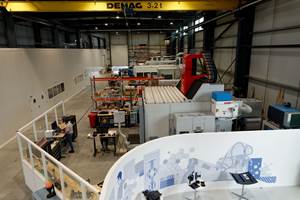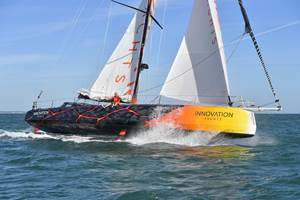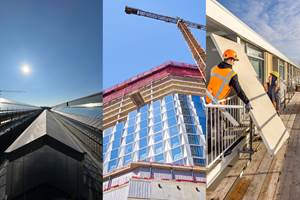FACC seeks 200 new hires in IT, digitalization, innovation and automation
Upswing in aviation, including 2021 new contracts worth €1 billion, impels FACC investment of €150 million to support short-cycle processing of lightweight composites, recycling and expanded production via automation and next-gen manufacturing technologies.
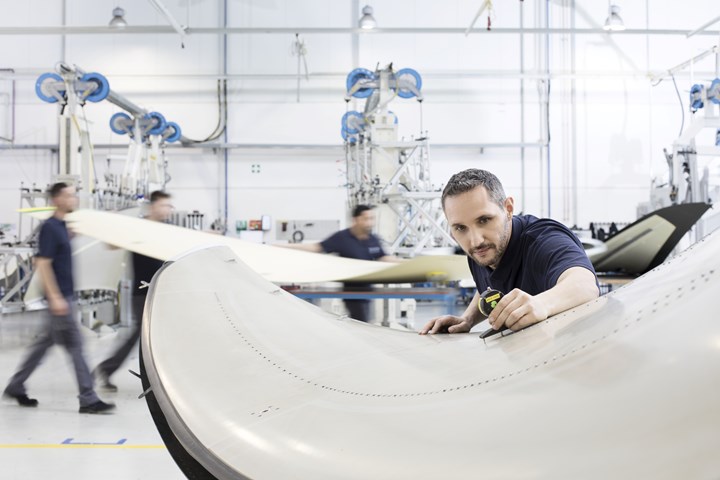
Winglet production. Photo Credit, all images: FACC AG
The international aerospace group FACC AG (Ried im Innkreis, Austria) is harnessing the positive developments in the global aircraft market for its own systematic growth; according to FACC, demand is on the rise, and a noticeable increase in sales is on the horizon for 2022. Consequentially, the high-tech group is adding more than 200 new employees to its workforce and launching an investment initiative totaling €150 million (~$172 million).
The aviation industry is currently experiencing an upswing — airlines are starting to expand their fleets again, FACC says, and the positive industry trend is significantly stronger in some areas than recently forecast. FACC is consistently taking advantage of these opportunities. The aerospace company, which boasts aircraft manufacturers such as Airbus (Toulouse, France), Boeing (Chicago, Ill., U.S.), Embraer (São Paulo, Brazil), Bombardier (Montreal, Canada), Rolls Royce (London, U.K.) and Pratt & Whitney (Hartford, Conn., U.S.) among its customers, expects significant sales growth in 2022, and is pursuing a consistent expansion strategy for the coming years.
“Last year alone [2021], we were able to secure new contracts worth more than €1 billion,” reports Robert Machtlinger, CEO of FACC AG. “We are also focusing on a long-term growth strategy for the future, and are now launching an employment and investment initiative.”
One such initiative includes FACC’s hiring of more than 200 new employees at its Upper Austrian locations. The focus of the newly created jobs is production. The company seeks to fill vacancies in the areas of IT, digitalization, innovation management and automation, with recruitment already underway.
In addition, FACC has agreed on a comprehensive investment package for the next five years. A total of €150 million (~$172 million) are to be invested in the following three areas:
New projects
- In 2021, FACC was awarded a contract for the European Ariane 6 space program. A potential first application of the lightweight innovation is the HERA project for planetary asteroid defense technology. The goal is to test the extent to which an asteroid can be deflected from its trajectory by means of two comets passing by Earth.
- Airbus has commissioned FACC with the production of the empennage components for the A220, thereby sustainably strengthening the close cooperation spanning decades. FACC is the sole supplier of the rudder and elevator for the A220.
- FACC has developed a state-of-the-art business jet cabin for the Canadian aircraft manufacturer Bombardier. The production of the cabin interior for the Bombardier Challenger 3500 constitutes a major project for the coming years.
Strong expansion of research and development (R&D) for consistent sustainability and increasing competitive strength
FACC says it is working intensively on new materials and production technologies. Here, two major goals go hand in hand: consistent sustainability and steadily increasing competitive strength:
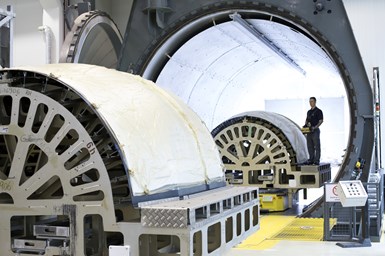
- FACC is intensively researching new lightweight materials and their processing methods. These so-called composites offer several advantages at once: They are resistant and durable, boast a long life cycle and save fuel and thus CO2 in flight operations due to their low weight. The company is also taking systematic steps to innovate and improve the manufacturing process, focusing in particular on reducing the curing time of parts. This saves energy while cutting CO2 emissions.
- The recyclability of components will constitute a further R&D focus in the coming years; chemical product components are to be replaced by biological substances, for instance, from the sugar cane industry.
- Through the development of additional high-performance automation technologies, FACC continues to drive forward the industrial production of lightweight construction systems for aircraft. The goal is to reduce throughput times, cut manufacturing costs and consume less energy.
- As part of its investment initiative, FACC will also be intensifying and expanding its collaborative research with leading companies in the aircraft industry, for instance the Airbus Wing of Tomorrow program.
Expansion of production facilities
In the past year, FACC concluded contracts in excess of €1 billion with its customers. To equip itself for the future, the aviation group will be expanding its production facilities with next-generation technology and building new, highly automated plants.
With its recently launched employment and investment initiative, FACC is taking clear steps towards sustained growth in the coming years. By 2030, FACC aims to establish itself among the top 50 aerospace groups worldwide; it is currently among the top 100. “Committed to the sky — at all levels” is the order of the day.
Related Content
Plant tour: Daher Shap’in TechCenter and composites production plant, Saint-Aignan-de-Grandlieu, France
Co-located R&D and production advance OOA thermosets, thermoplastics, welding, recycling and digital technologies for faster processing and certification of lighter, more sustainable composites.
Read MoreEuropean boatbuilders lead quest to build recyclable composite boats
Marine industry constituents are looking to take composite use one step further with the production of tough and recyclable recreational boats. Some are using new infusible thermoplastic resins.
Read MoreBio-based, fire-resistant composites become mainstream
Projects use Duplicor prepreg panels with highest Euroclass B fire performance without fire retardants for reduced weight, CO2 footprint in sustainable yet affordable roofs, high-rise façades and modular housing.
Read MoreCorebon induction heating
This sidebar to CW’s August 2024 feature article reviews this technology for more efficient composites manufacturing and why it aligns with Koridion active core molding.
Read MoreRead Next
Cutting 100 pounds, certification time for the X-59 nose cone
Swift Engineering used HyperX software to remove 100 pounds from 38-foot graphite/epoxy cored nose cone for X-59 supersonic aircraft.
Read MoreNext-gen fan blades: Hybrid twin RTM, printed sensors, laser shock disassembly
MORPHO project demonstrates blade with 20% faster RTM cure cycle, uses AI-based monitoring for improved maintenance/life cycle management and proves laser shock disassembly for recycling.
Read MoreScaling up, optimizing the flax fiber composite camper
Greenlander’s Sherpa RV cab, which is largely constructed from flax fiber/bio-epoxy sandwich panels, nears commercial production readiness and next-generation scale-up.
Read More






